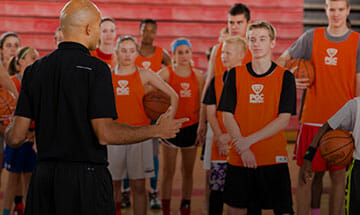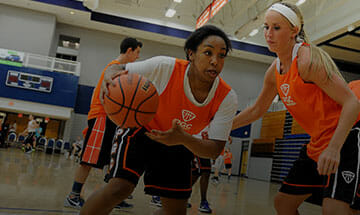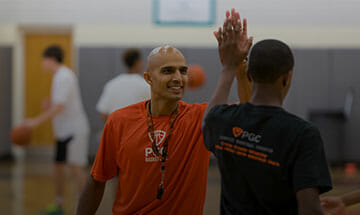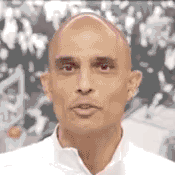Falling Head over Heels (in love) Might Just Get You to the Pros
Fall in love – I’m talking about falling HEAD OVER HEELS in love – and you’ll be a better basketball player. Now, some of you may be thinking I just met the woman of my dreams, but I actually just finished a clinic in Eastern Washington and there I met the woman… (No-no-no, I’m just kidding, only the clinic part is true.)
As a young high-school athlete I’d never experienced falling in love, not until I started training with professional athletes in Houston. (Yes, just as the commercial says, the NBA CARES, they really do.) That was where I got to know Miss Takes. Oh, I didn’t love her immediately – I even cursed at her at the beginning of our relationship – I wanted her to go away, but somehow, I could never get rid of her. I began to appreciate her and eventually, I grew to love my Miss Takes.
Professional athletes love to make mistakes during their training. They push themselves until mistakes occur because athletes at the highest level know that mistakes – during maximum effort – are the path to improvement. In fact, mistakes are tiny signs of improvement.
Athletes, get this formula into your basketball brain:
(Mistakes X Correct Form) / Maximum Effort + Charting Results = Improvement
If you compare most high school athletes to professional athletes, the difference in how mistakes are viewed is glaring. Steve Nash has said, “I’m uncomfortable being comfortable”, and what the two-time MVP means by that is: if he’s training at a level of comfort – if he’s not pushing himself to the level of mistakes – then he’s actually uncomfortable because he knows he’s not IMPROVING.
This past weekend, after the first day of the clinic, I asked athletes on the way out how they felt about the first day and one responded with, “I feel like I got worse today.” After asking her to elaborate, she responded with, “I made so many mistakes.”
At PGC, we pride ourselves on creating an environment focused on the encouragement of Learning and Development, not on Evaluation. Even after stating this in class and reinforcing it on court, I couldn’t blame this athlete for her response because I realized that throughout her entire career she had been taught that mistakes were bad. This made me realize that a lot of athletes may be having similar experiences.
In the U.S. we’re putting young athletes more and more in “evaluative” environments (a.k.a. Games, games, and oh yea, more games). Athletes learn that mistakes equal poor performance and disappointed parents or coaches.
Athletes who train only in evaluation environments tend to do one of two things: they slow down so they don’t make those mistakes that cause their coaches to yell at them; or they start playing tentatively, trying NOT to make mistakes. If I had 17-cents for every parent who asks how to help their son/daughter “play like they used to” or “play looser or with more confidence” I would be sipping Pina Colados with T.O. himself on some private island beach. (Terrell would probably be doing crunches in the sand, but I’d be relaxing.)
Luckily, this young athlete at the clinic responded differently on day two and began to realize the importance of mistakes on the road to becoming a better player, but it didn’t prevent me from still feeling sorry for all those athletes who aren’t being encouraged to make mistakes at full speed in order to become a better player.
Athletes: FALL IN LOVE with mistakes during your training. It’s how you get better.
Coaches: Obviously the Championship Game is not where you’d like your athletes to make the most mistakes, but what if we provide them with an environment that encourages mistakes often and early during training and in practice. What if we even rewarded them for making the mistake if they were going full throttle? Hmmm.
Thoughts? Agree? Disagree? Let me know, I love making mistakes as a blogger, because I want to get BETTER. Hit that little bottom below that says “Comment”.
“PUSH DA BUTTON Mr. Bond, PUSH DA BUTTON”
Related Articles
5 Ways to Practice Mental Toughness
Here are five ways to practice your mental toughness off the court. If you practice these five things, every day, you’ll develop greater self-discipline. You’ll become unstoppable in anything you do. It is five things you will have to rise above your feelings every day. That is how you build mental toughness. You develop, as a habit, a muscle of rising above your feelings to level of your aspirations and commitments.
Why Is My Performance Inconsistent?
Do you ever feel like your performance in games is consistently inconsistent? That you’re putting in the same hard work at practice every day, yet some days you play really well and others you don’t play well at all? If that’s you, you’re not alone. If that’s not you, don’t worry—the frustration is coming soon!
Quit Being So Hard to Coach
COACHES HAVE FAVORITES!! Of course, they have favorites—their favorites are the players they can trust, on and off the court.
Here are four reasons you may not be getting the playing time you think you deserve.
About PGC
PGC Basketball provides intense, no-nonsense basketball training for players and coaches. Our basketball camps are designed to teach players of all positions to play smart basketball, be coaches on the court, and be leaders in practices, games and in everyday life.
We combine our unique PGC culture with a variety of teaching methods and learning environments to maximize the learning potential of those that attend our sessions. In addition to spending 6-7 hours on the court each day, lessons will be reinforced through classroom sessions and video analysis.
Our goal at PGC is to empower you with the tools to fulfill your basketball dreams, while also assisting you in experiencing the joy of the journey.
To learn more about PGC Basketball, including additional basketball training tips and videos, visit our YouTube Channel or find us on Facebook, Instagram, and Twitter.













Share This Post